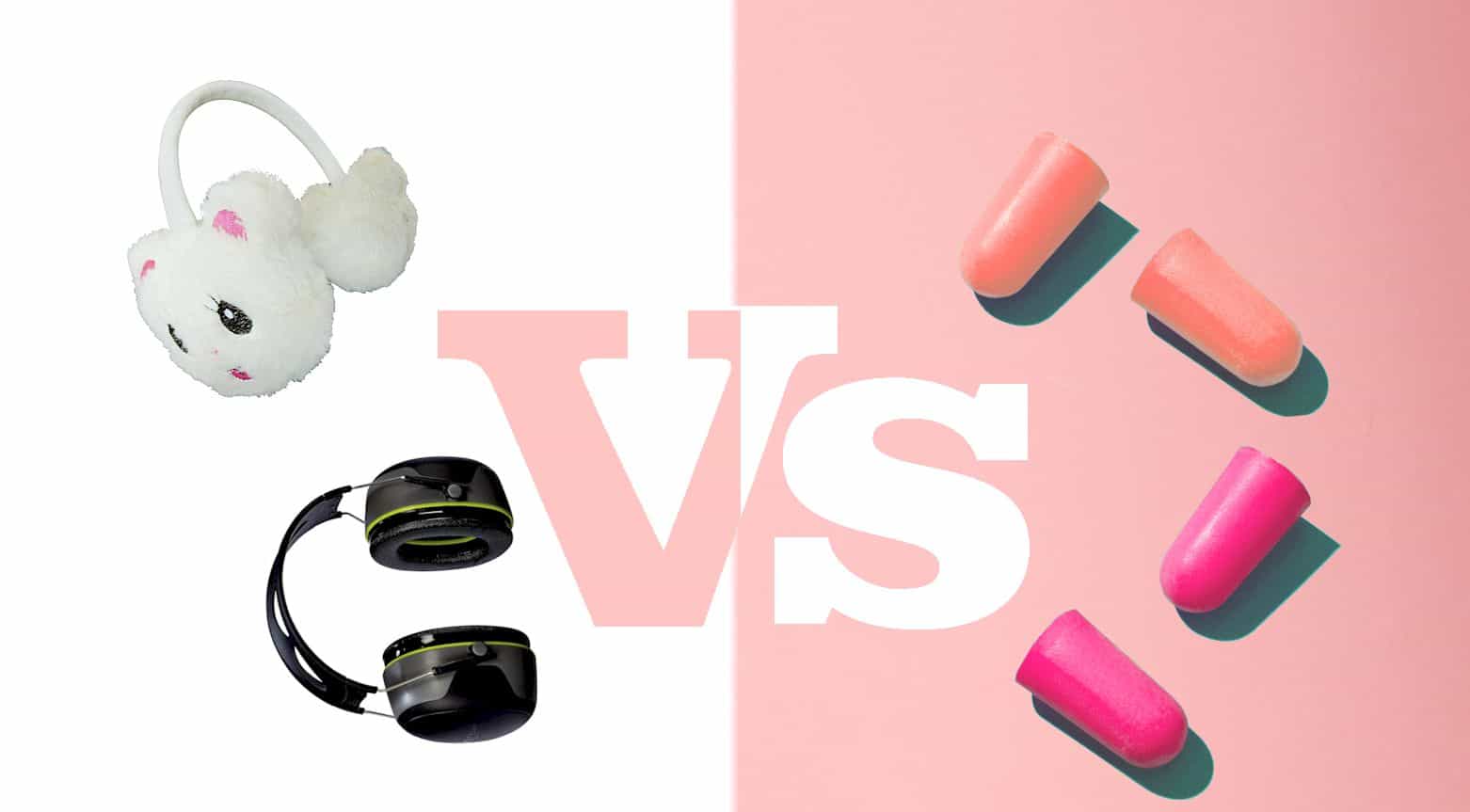Whether you’re working in the construction industry or you manage events like concerts and festivals, you need adequate ear protection. People often debate over earplugs vs earmuffs, if earplugs provide better protection or earmuffs are far superior for loud noises.
Let’s find out more about earplugs especially new electronic earplugs and active ear plugs and the latest noise-canceling ear muff models in this comparison review.
Contents
Ear Muffs
Ear muffs look similar to headphones as these are worn over the ear. An adjustable headband usually made of tough plastic or metal holds the ear muffs in place. An ear muff may be made of plastic and layers of foam. These form durable and effective layers of protection to block loud noises.
How do ear muffs work?
Ear muffs work well in canceling external noises. Noise-canceling earmuffs are designed to fit very well over the head and ears. The adjustable headband comes with a layer of foam to cushion the head while the ear muff covers the ear snuggly.
If you inspect an ear muff, you will find layers of foam and plastic that tightly cover the outer ear and thus, canceling all kinds of sounds and noise. Some ear muffs have a radio or can play music and take calls as you can connect it to your mobile phone.
There are simple ear muffs for noise reduction models with soft wool or cotton outer lining. These types offer enhanced protection from the cold.
Where should you use ear muffs better?
Loud sound ear muffs can be used almost anywhere there are loud noises. It is handy in construction sites, airport runways, concerts, racing garages, factories, railroad stations, and more. You can also use ear muffs at home especially when you want to concentrate better on work or tasks.
Pros and cons
Pros
- Ear muffs are very easy to use; just wear them over your head and you're ready to go!
- Hearing protection earmuffs are adjustable so you can purchase any size and they will still fit well.
- Ear muffs are easy to clean and maintain.
- Ear muffs may be used by people who have sensitive ears.
- Ear muffs are very durable and can be used over and over again.
- Some ear muffs will protect your ears from the cold.
Cons
- Ear muff hearing protection is not as effective as ear buds
- Ear muffs will be very uncomfortable in hot and humid environments.
- It’s hard to wear ear muffs with other safety equipment like safety goggles and shields.
Ear Plugs
Ear plugs are designed to fit inside the ear canal and thus cover the ears completely. These come with a special shape that sits inside the ear so these won’t fall out when you’re moving or working at a site. Other terms for ear plugs are ear protection earbuds, ear defense high fidelity earplugs, and many more.
How do ear plugs work?
Ear plugs are made from a special material called silicone which is soft, hypoallergenic, and fits well inside the ear canal. As you wear ear plugs, any exterior sound or noise will be blocked, and thus, you'll have maximum hearing protection.
You won't have to worry about ear plugs lodging inside your ear as these come with anchors or strings so you can easily remove them later. Some ear plugs are specially made/personalized and thus, the wearer gets maximum protection. Meanwhile, most of the ear plugs headphones available in the market have a set size; you just need to figure out which one fits in your ear.
Where should you use ear plugs better?
Since ear plugs provide maximum protection from all kinds of noise, they can be used in the noisiest environments. You can wear these in oil rigs, factories, airports, space station hangars, gun firing ranges, and more. Ear plugs can completely protect your ears without being seen in plain sight. Hence, you can use these in concerts, discos, music festivals, band performances, and in other social gatherings.
Pros and cons
Pros
- Earbud hearing protection and noise cancellation are incomparable to ear muffs.
- Ear plugs are easy to take anywhere because of their size.
- Ear plugs are waterproof.
- Ear plugs can be worn anywhere, anytime.
- You can’t tell if a person is wearing ear plugs.
- You can wear ear plugs even if the weather is hot and humid.
- You can wear ear plugs with other PPE.
Cons
- Ear plugs may be uncomfortable in people with sensitive ears.
- Ear plugs should fit well to work well. If it’s too loose, it can come off. If it’s too large, it can hurt your ears.
- It's easy to lose ear plugs because of their size.
Earplugs vs earmuffs – Choose Your Right Hearing Protection
Whether earplugs work best or earmuffs offer the best protection will depend on your needs. If you work in dangerous, high noise level environments then specially-designed earplugs would be the best choice for you.
However if you have sensitive ears and you’re not comfortable with fitted noise canceling ear plugs in your ear, ear muffs are clearly better for you. If you need noise cancellation or noise protection at home then ear muffs will suffice. But if you prefer the stealth design of ear plugs then go for it.
Simple ear muffs are cheaper than other ear protection devices but may not provide the best noise protection. Meanwhile, custom-made earplugs are expensive but provide the best noise protection than other devices.
If you’re wondering about noise-canceling headphones vs earplugs, you can choose headphones if you’re uncomfortable with earplugs. And just like ear muffs, these may not provide the best protection.
Last Words
If you’re wondering about earplugs vs earmuffs, the answer depends on your working or environmental conditions. If you work in a high-noise environment or you're frequently exposed to loud noise, we recommend using custom-made earplugs to protect your hearing. But if you find ear plugs uncomfortable then you may settle with noise-canceling ear muffs instead. Never overlook hearing protection to preserve your ears and to avoid conditions like tinnitus and ear damage.our text here...

Graduated with a Bachelor of Audio Engineering and Sound Production. He has worked with a number of studios as a Recording Engineer, with over 10 years of servicing experience in both re-recording mixing and sound editing.

